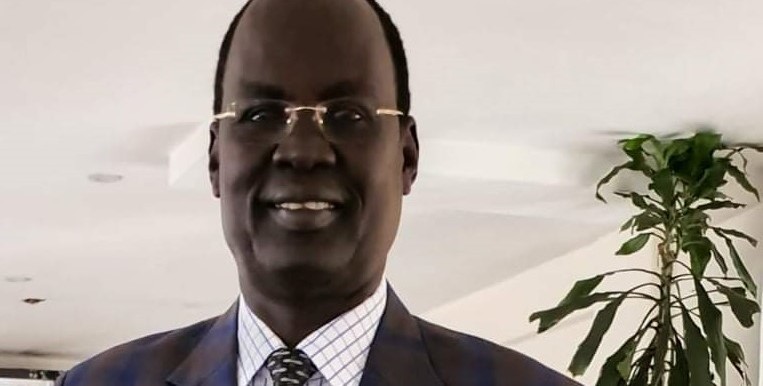The former Sudan People’s Liberation Movement in Opposition (SPLM-IO) governor of the now-defunct Sobat State, Duer Tut Duer, has said the presidency should immediately revoke the appointment of the new Upper Nile governor, Budhok Ayang Kur and replace him with the initial party nominee, Gen. Johnson Olony.
Late last month, President Salva Kiir Mayardit appointed Budhok Ayang Kur and James Tor Monybuny as Upper Nile state governor and deputy governor respectively, ending a six-month stalemate between Kiir's government and SPLM-IO over the nominee for the gubernatorial post.
Duer, also a member of his party’s National Liberation Council told Radio Tamazuj that the decision to appoint Budhok Yang is not acceptable to the SPLM-IO members and the people of the Upper Nile state for several reasons.
“Several consultative meetings were held in Khartoum, Maganis, Addar, Fashoda, and Sobat, and they all agreed that Olony should remain as their nominee. If they don’t want to appoint Olony as the governor of Upper Nile, it is better to remain without a governor. Now we are surprised that Kiir and Machar decided to appoint Budhok,” Duer said.
“So what we want to say is that Kiir has no right to replace or reject the nominee of the SPLM-IO because Kiir is not a member of the IO. Machar has no right to replace Olony with anybody else because Machar himself is not from the Upper Nile state. This is a conspiracy from Machar against the people of Upper Nile and Olony,” he added.
According to Duer, the appointment of Budhok is unacceptable because it is a conspiracy against democracy.
“Why have they rejected our nominee? The appointment of Budhok was decided only between Kiir and Machar. How is governor Budhok going to rule if the people of the state do not support him? So, what we are seeing is that the two leaders have declared war and conspiracy against our people,” Duer stated.
“There are five tribes in Upper Nile and 13 counties. So, if one county decided to reject Olony, the rest of the 12 counties wanted Olony as their governor. If 3 counties do not support Olony, there are still 10 counties that support him. Up to this moment, we are still maintaining our nominee. We don’t recognize the appointment of Budhok,” he explained.
Duer said the people of Upper Nile agreed that Gen. Olony was their nominee, and insists the people's will must be respected.
“The only way is for Kiir and Machar to revoke their decision and replace Budhok with Olony,” Duer concluded. “We will not recognize Budhok as the governor. If they want things to go right, they should bring Olony on board as our governor.”
Abraham Mariak Albino, a renowned journalist, and political analyst said the appointment of a governor for Upper Nile State was a positive step towards achieving lasting peace.
“I listened to the speech of the newly appointed governor of Upper Nile shortly after his appointment and I also came across some reactions from other prominent political figures who hail from Upper Nile, such as Doctor Lam [Akol]. All of them were calling for a political dialogue among different ethnic groups of the Upper Nile region,” Mariak said.
“The governor delivered a positive speech and pointed out that the Dinka group who are in Upper Nile are his uncles. He stressed that he has blood relations with all groups in the state, including his deputy, Mony Buny. So I regard this statement as very important because it helps the new leadership to work together and develop their state,” he added.
He said that the newly appointed governor is a prince of the Shilluk kingdom, “he hails from the ruling family and he should have a lot of influence among citizens. So I expect him to influence a lot of lives in the area.”
According to Mariak, it is time for Gen. [Johnson] Olony who was the original nominee to exhibit goodwill.
“He should now be able to answer very important questions, whether he took up arms for his interest in the political position or was it for the interest of the people. Because the person who is now a governor hails from the same party [SPLM-IO] and hails from the same ethnicity as Olony in Upper Nile,” Mariak said. “He [Olony] should now give a chance for the implementation of the peace agreement, if he took up arms for the public interest, let the peace deal be implemented.”
According to Mariak, the peace deal is time-barred and its implementation will lead to elections where Olony can vie.
“So, General Olony has a huge chance in the upcoming elections. If he feels that he represents the majority in the area, he can contest and stand as the governor of Upper Nile and if he wins the confidence of all ethnic groups in the area, he can become the elected governor,” Mariak explained. “I think he has a big chance if he wants to support peace, stability, and peaceful coexistence for the Upper Nile region. This is the best choice at hand. South Sudanese tried war and fighting for nearly even years and they realized it had no benefit.”
Mariak says South Sudan has gained a lot through dialogue than war, “So, if I was given a chance to advise Olony, it would be that taking up arms will never achieve any political gains at the moment. But dialogue with the government or with his party as SPLM-IO would gain a lot. So whenever he seeks dialogue it will be better for him, government, and the people of South Sudan.”




